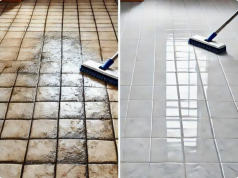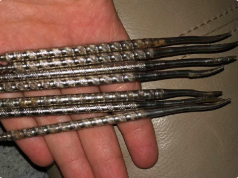No More Shattered Shells, No More Frustration**
We’ve all been there:
You carefully lower eggs into water, time them just right, cool them gently…
Then you tap, you roll, you peel—and half the white comes off with the shell.
What’s left looks less like a deviled egg, more like a lunar landscape.
The truth? It’s not you.
And it’s not even the eggs—not really.
It’s how you cook them.
Let’s uncover the gentle science—and the simple, time-tested trick—that turns peeling from a battle into a breeze.
Why Fresh Eggs Fight Back
Here’s the quiet truth most recipes don’t tell you:
The fresher the egg, the harder it is to peel.
Why?
In very fresh eggs, the egg white (albumen) is slightly acidic, causing it to cling tightly to the inner membrane of the shell—like tissue paper stuck to glass.
As eggs age (7–10 days), their pH rises, and that bond loosens.
Suddenly, the shell slips off like a silk glove.
But what if your eggs are farm-fresh? Or from the farmers’ market?
Good news: You don’t need to wait.
There’s a kinder, smarter way.
The “Hot Start + Ice Shock” Method: Foolproof & Gentle
(Tested by home cooks, chefs, and food scientists alike)
This isn’t about vinegar baths or poking holes.
It’s about respecting the egg’s natural rhythm—heat, rest, and cool—so the shell lets go on its own.
What You’ll Need
- Eggs (yes—even farm-fresh ones!)
- A saucepan with a tight-fitting lid
- A bowl of ice water (½ ice, ½ cold water)
- A slotted spoon
- Patience (just 15 minutes of it!)
Step-by-Step: The Gentle Way
1. Start in Boiling Water (Not Cold!)
→ Bring a pot of water to a full, rolling boil.
→ Gently lower eggs in with a slotted spoon (a splash of vinegar can help prevent cracks, but skip it if you dislike the taste).
Why it works:
The sudden heat sets the outer layer of the white just enough to create a micro-gap between the membrane and shell—like loosening a lid before you twist.
2. Cover, Rest, and Resist the Urge to Boil
→ Return to a gentle simmer for 30 seconds—just to reheat.
→ Remove from heat. Cover. Let sit:
• Medium eggs: 9 minutes
• Large eggs: 10 minutes
• Extra-large: 12 minutes
Why it works:
Steaming-in-place cooks the egg evenly—no rubbery whites, no green yolks, and no tight membrane grip.
3. Shock in Ice Water (The Real Magic Happens Here)
→ Transfer eggs immediately to the ice bath.
→ Let sit at least 15 minutes (up to 1 hour is fine).
Why it works:
As the egg cools rapidly, it contracts slightly inside the shell—creating tiny air pockets that act like little levers, prying the membrane loose.
4. Peel with Grace (Under Running Water)
→ Tap gently on the counter to crack the shell all over.
→ Roll between your palms to loosen.
→ Peel under cool, running water. Let the stream slip between shell and white, carrying fragments away.
→ Start at the wider end—where the natural air pocket lives. That’s your doorway in.
✅ Pro tip: For deviled eggs, peel while still slightly warm (after 10 mins in ice bath)—the white is firmer, less likely to tear.
Bonus Wisdom for Fresh Eggs
If your eggs are very fresh (less than 3 days old), add ½ teaspoon baking soda to the boiling water.
→ It raises the pH, mimicking older eggs—without altering flavor.
→ Works like a quiet whisper: “It’s okay to let go.”
What Doesn’t Help (Despite What You’ve Heard)
🚫 Vinegar in water: May reduce cracking, but doesn’t ease peeling—and can leave a faint tang.
🚫 Poking holes in the shell: Unnecessary; often causes leaks and uneven cooking.
🚫 Peeling while warm: Heat seals the membrane. Always cool first.
🚫 Shaking in a jar of water: Fun for kids, but often bruises the white and wastes water.
Why This Matters—Beyond the Kitchen
Perfectly peeled eggs aren’t about Instagram aesthetics.
They’re about:
- Deviled eggs that gleam at the church potluck
- Egg salad sandwiches with no gritty shell surprises
- Meal prep that feels manageable—not frustrating
- Teaching little hands to cook with confidence (no tears—yours or theirs!)
It’s the quiet joy of a task done well.
Of honoring simple things with care.
Of turning a daily chore into a small act of grace.
Some of the best kitchen wisdom isn’t flashy.
It’s not in fancy gadgets or viral hacks.
It’s in the quiet understanding of how things work—
and the patience to work with them, not against.
So the next time you boil eggs,
start with boiling water.
End with ice.
And let the peeling happen—
not with force,
but with flow.
You’ve got this, Joye.
And your deviled eggs?
They’re going to be beautiful.










